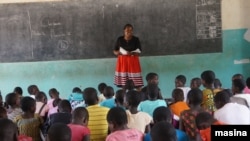Teachers in Malawi's public schools have resumed a nationwide strike after the government backed out of a promise to pay bonuses for COVID-19 risk. Malawi authorities say the government has no money to pay the teachers, who risk contracting the coronavirus by teaching classes in person.
Malawi’s public-school teachers resumed their nation-wide strike Tuesday after the government did not honor a promise to pay bonuses for their risk of contracting the coronavirus while on the job.
President of the Teachers Union of Malawi, Willy Malimba, said they began the stop work action after authorities failed to meet a seven-day ultimatum.
"We felt cheated on this one because we agreed and at that time it was a high-level meeting. We did that one at parliament," said Malimba. "We had Presidential Task Force [on COVID-19], we had committee of education, when we were making that agreement.”
Malimba said teachers take risks when working in packed classrooms during the pandemic and will not resume work until the government gives them the promised bonus.
But Malawi’s government says teachers were not among those budgeted to receive a COVID-19 risk allowance.
Malawi government spokesperson Gospel Kazako says, despite what was promised, they do not have the money to meet the teachers’ demands.
"People can squeeze government but, if the government doesn’t have a resource, it does (not) have a resource and you must know that we are not doing these things out of malice or that we are careless," said Kazako. "No, we are not.”
Kazako is also Malawi’s Information Minister and a member of the Presidential Taskforce on COVID-19. He says they will meet teachers on Thursday to discuss their welfare – but not the bonus, which he argues would be short-term anyway.
"Teachers have a lot of problems beyond COVID allowances," said Kazako. "We need to sort out their salaries, we need to sort out their condition of service, we need to sort out their housing allowances, so many other things not just COVID. The thing is, assuming in the next three months there is no COVID, it means they will not have any allowance.”
Steve Sharra specializes in education for the Nairobi-based, non-profit African Institute for Development Policy.
He says the government should reach a deal with teachers so that Malawi’s students don’t lose any more class time.
"It will be important for movement to be quite open about what’s going on. If they say there is no money, that’s not enough of an explanation," said Sharra. "It is possible for the government to have no money but to come up with an explanation that teachers can understand and can compromise and then they can resume work.”
Malawi’s teachers first began striking in January when schools reopened after months of being closed due to the coronavirus.
They resumed work in February after the government promised to give them money to buy personal protective equipment.
Malawi first closed schools in March 2020, even before it confirmed its first cases of COVID-19.
The government reopened schools in September only to suspend classes again in January after a surge in infections, including among some teachers and students.





